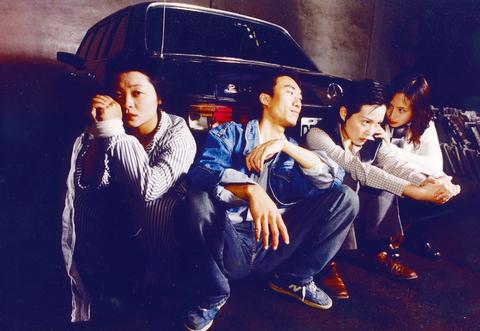The brutal murder of Teena Brandon, which took place in the US eight years ago, has proved a rich seam for both scholars and artists. The most recent addition to a crop of films and artworks is a play by the Rive Gauche Theater (河左岸劇團), which will be staged at the Whashang Art District in Taipei this weekend.
The story of Teena Brandon has been told in the documentary The Brandon Teena Story by Susan Muska and Greta Olafsdottir and the Oscar-winning film Boys Don't Cry, which pushed actress Hilary Swank into the top rank of Hollywood's stars. And there is a multimedia installation work by American-Chinese artist Shu-lea Cheang (鄭淑麗) at the Guggenheim Museum in New York also based on the Teena Brandon murder.
Now, the Rive Gauche Theater, which is noted for its avant-garde theatrical style, will present a Taipei version of the Teena Brandon story titled Murd(h)er Scene (她殺現場), by up-and-coming director Mia Chen (陳明秀) and a cast of five young actors and actresses.

PHOTO:
In the actual events of the Teena Brandon story, Teena, a 21-year-old who disguised herself as a man named Brandon, leaves home and falls in with two male friends, John and Tom. She also acquires a girlfriend called Lana. But when her biological identity is discovered, the two men, angry at having been deceived, rape her and subsequently kill her.
Rive Gauche Theater's Murd(h)er Scene will tell a similar story set in Taipei, in which a tomboy who calls herself Ricky falls in love with a bar hostess. As with Teena Brandon, the story ends in tragedy.
The most intriguing part of Chen's play is not the story, but rather the playful, and sometimes confusing, presentation of gender.
"One of the most interesting things in the Teena Brandon story is the way a biological woman manages to convince people that she is a man, and how she is forced to return to her biological identity when her secret is discovered," Chen said. "I think theater is a perfect medium to represent the tensions and dynamics of gender and performances," she added.
For example, the play includes a 10-minute solo performance by the Brandon character in which she first appears as a woman in a suit, then as a man dressed in a woman's clothes, then, removes her clothes, reveals her breasts. Finally she reverts to her male image. For the audience, this segment is like witnessing Teena/Brandon's gender identity switching back and forth, culminating in the scene where she is murdered.
Another aspect of Murd(h)er Scene is the playful switching of roles during the course of the play.
"The show will also be an opportunity for the audience to think about their own gender identity," said Chen. When entering the theater of Whashang Art District, the audience will be led along a path beside a screen, onto which they will be silhouetted. "Theater staff will ask members of the audience to perform some stereotypical male or female gestures as they pass by the screen before taking their seats," said Chen.
The giant white screen will also play a major part in the play. Images of Teena Brandon and a range of Hollywood figures, including James Bond and Vivien Leigh, will be projected over Whashang.
What: Murd(h)er Scene by the Rive Gauche Theater
When: June 29, 30: 7:30pm, 9:30pm, July 1: 7:30pm
Where: Whashang Art District, 1 Pateh Rd., Sec. 1 (北市八德路一段1號), tel (02) 2392-6180
Tickets: NT$350

“Why does Taiwan identity decline?”a group of researchers lead by University of Nevada political scientist Austin Wang (王宏恩) asked in a recent paper. After all, it is not difficult to explain the rise in Taiwanese identity after the early 1990s. But no model predicted its decline during the 2016-2018 period, they say. After testing various alternative explanations, Wang et al argue that the fall-off in Taiwanese identity during that period is related to voter hedging based on the performance of the Democratic Progressive Party (DPP). Since the DPP is perceived as the guardian of Taiwan identity, when it performs well,

The Taiwan People’s Party (TPP) on May 18 held a rally in Taichung to mark the anniversary of President William Lai’s (賴清德) inauguration on May 20. The title of the rally could be loosely translated to “May 18 recall fraudulent goods” (518退貨ㄌㄨㄚˋ!). Unlike in English, where the terms are the same, “recall” (退貨) in this context refers to product recalls due to damaged, defective or fraudulent merchandise, not the political recalls (罷免) currently dominating the headlines. I attended the rally to determine if the impression was correct that the TPP under party Chairman Huang Kuo-Chang (黃國昌) had little of a

At Computex 2025, Nvidia CEO Jensen Huang (黃仁勳) urged the government to subsidize AI. “All schools in Taiwan must integrate AI into their curricula,” he declared. A few months earlier, he said, “If I were a student today, I’d immediately start using tools like ChatGPT, Gemini Pro and Grok to learn, write and accelerate my thinking.” Huang sees the AI-bullet train leaving the station. And as one of its drivers, he’s worried about youth not getting on board — bad for their careers, and bad for his workforce. As a semiconductor supply-chain powerhouse and AI hub wannabe, Taiwan is seeing

Jade Mountain (玉山) — Taiwan’s highest peak — is the ultimate goal for those attempting a through-hike of the Mountains to Sea National Greenway (山海圳國家綠道), and that’s precisely where we’re headed in this final installment of a quartet of articles covering the Greenway. Picking up the trail at the Tsou tribal villages of Dabang and Tefuye, it’s worth stocking up on provisions before setting off, since — aside from the scant offerings available on the mountain’s Dongpu Lodge (東埔山莊) and Paiyun Lodge’s (排雲山莊) meal service — there’s nowhere to get food from here on out. TEFUYE HISTORIC TRAIL The journey recommences with